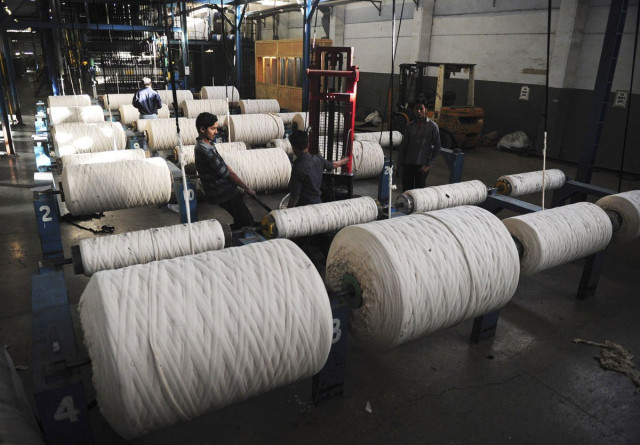Value addition key to reviving textile sector
Industry official says producers need to switch to advanced production methods

PHOTO: AFP
Key components of the strategy, according to Hassan, include investments in upgraded machinery, focus on producing finished or value added products, establishing stronger links with international research institutes devoted to the sector, government support and diversification of product range.
Textile industry to protest in front of parliament after Eid
Addressing a meeting to discuss the problems faced by the textile sector, he said that existing power looms need to be upgraded to improve the type and quality of textile products being produced in the country, apart from increasing profitability for power loom owners. New and upgraded machinery will mainly help reduce costs of production.
“Comprehensive value addition by producing fashion garments is necessary to earn optimum profit from the textile chain,” he said, adding that finished goods earn the highest profit margins and textile producers should focus on advancing production lines to that stage by switching from raw cotton or cotton yarn production to ready-made garments.
Dividing the weaving sector into organised and unorganised production units, Hassan said that the government needs to dole out sufficient incentives to bring the latter into formal supply chains by installing standard machinery and replacing depleted ones.
This, he believes, will increase export and production potential of the country since several production units with depleted machinery produce low quality garments which do not meet export quality standards.
Textile millers now warn of protest in Islamabad as exports fall
“Strong relations need to be established between local and foreign training and research institutes to increase exposure to new technologies and adopt them,” Hassan advised while lauding the recent collaboration between National Textile University (NTU) and Korea for the establishment of a technical textile center at the former. He also stressed the need for diversification in cotton related products produced by local businesses.
“We should mix polyester with cotton to produce a wide range of textile products which can cater the needs of different markets,” he suggested, adding that large amounts of foreign exchange was already being earned by the cotton chain.
In spite of this, he lamented, the government was ignoring the sector evidenced by the lack of a textile minister. He said that negligence coupled with counter-productive economic policies by government departments in the name of export diversification was harming the textile sector.
He also expressed concern over non-implementation of the Rs180 billion textile package announced in the recent budget, while criticizing delays in payments of rebates.
Published in The Express Tribune, July 7th, 2017.
Like Business on Facebook, follow @TribuneBiz on Twitter to stay informed and join in the conversation.


















COMMENTS
Comments are moderated and generally will be posted if they are on-topic and not abusive.
For more information, please see our Comments FAQ